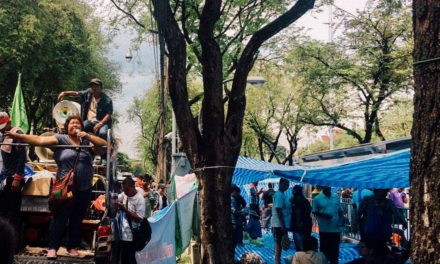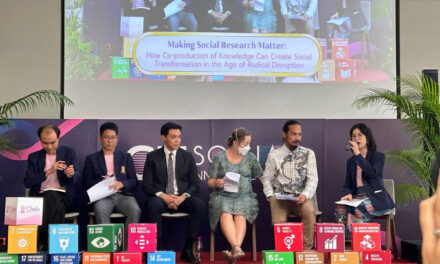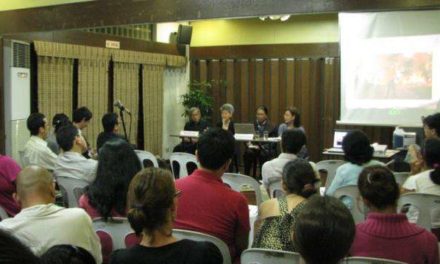BANGKOK, 9 November – In one of the first protests on the international day of action against the WTO, more than 1,500 farmers, jasmine rice producers, trade unionists and HIV/AIDS activists marched from Bangkok’s World Trade Centre to the US Embassy.
Watched by about 100 police and embassy security, the protestors called for the WTO to get out of agriculture and an end to patenting of life and drugs. Leaders from the Assembly of the Poor, Thailand’s largest social movement, farmers organisations from around the country and the national AIDS networks, presented petitions to the US embassy representative Mr Win Dayton demanding US action on drugs and rice patenting, and a change to the US position on WTO negotiations.
Meanwhile, one well-known farmer leader speaking from the rally truck expressed his sympathy to the US for the loss of life on September 11, but said that the US has killed people everywhere. Patents on drugs kill people, he said, and patents on rice make the farmers suffer. "The US will create bin Laden allies in Thailand with its policies on drugs and rice," he warned.
Rice is the soul of Thai culture and sentiments here are running high since it was revealed that the International Rice Research Institute (IRRI) had illegally given germ of Thailand’s ‘hom mali’ (jasmine) rice to US researchers. Jasmine rice growers fear that if scientists patent a variation on the famous scented rice, their exports could suffer. Thailand currently produces 30 per cent of all internationally traded rice.
Pricing of HIV AIDS treatment drugs is also a hot issue. Only five per cent of Thailand’s 750,000 AIDS sufferers can afford treatment, yet the government’s efforts to allow the production of generic drugs have met with heavy diplomatic and economic pressure from the US, which has sent a string of trade envoys claiming that the changes breach bilateral agreements and are "unacceptable to the US."
Thai workers were also out in force. Over one hundred unionists from the national carrier Thai International were protesting at further privatisation of the airline. Khun Boonchuey, a ground-crew technician, said "When the companies privatise, people lose their jobs and in Thailand there is no job security, no social safety nets. We are left with nothing."
Junya Yimprasert, co-ordinator of the Thai Labour Campaign agreed. "Trade policies, she said, "do not protect the workers and they cause many people to lose their jobs."
Hundreds of state employees, autoworkers, maritime, transport and services workers joined the rally, responding to the ICFTU call for an international day of action.
The US embassy is in the heart of Bangkok’s financial and diplomatic district and one of the few tree-lined streets in the hot sprawling city. After several hours of standing, the workers and farmers settled in the shade to eat and drink, watched by well-dressed office workers and embassy staff. One man approached a group of protestors introducing himself as an American working for a TNC. "I have one question," he said. "Why do you think you can protest about patenting when Thailand has been violating copyright for years? You can buy a Harry Potter CD at the local market for 150 baht [about $4]. Tell me, what gives you the right to complain about copyright?"
Khun Kingkorn Narinthrakul, who works with peasants in the North of Thailand, wasn’t surprised at this idiotic comparison between entertainment CDs, life saving drugs and farmers livelihoods and replied politely "Does this make anyone die? And besides, it’s the only way the poor people can see Harry Potter."
Before marching off to Lumpini Park for an afternoon of music and speeches, villagers set off fire-crackers and burnt chilli and salt – a ritual which locals believe brings bad luck to bad people. The smoke wafted into the embassy.









